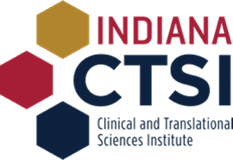¶ Indiana CTSI Monon Collaborative Data Team |
 |
|
| 410 W. 10th St., HS 2000, Indianapolis, IN 46202 Contact: ictsi@indianactsi.org |
Academic | |
| Role(s) | • Investigate social determinants of health, patterns of healthcare and social service utilization, justice involvement and residential mobility to identify opportunities for intervention and improve health equity in Indiana. • Engage community stakeholders in order to offer data-related needs assessment and evaluation resources (as part of the Monon Collaborative ‘science in service to the community’). |
|
| Mission | Address health inequity in Indiana through linking existing individual-level clinical and non-clinical data. | |
| History | • >10 years of partnerships with justice, public health, and community agencies to establish trusted data-sharing agreements for the purpose of grant-funded research • Recent shift to share aggregated (de-identified) data in response to community-driven questions, thereby deepening existing partnerships and establishing new ones |
|
| Org | • Consortium of academic investigators (13), community partners (many), trainees (doctoral/post-doctoral students), and staff (4). • Data use agreements managed by Indiana University and data reside on secure server maintained by Indiana University. |
|
| Board | There is no board of directors. Our team, however, has frequent engagement with our data-sharing partners to seek opportunities for collaboration, to disseminate findings, and to offer direct value back to each organization. | |
| Finance | Extramural grant funding (NIH/AHRQ: ~$1M/year) and intramural grant funding (e.g., IU Addictions Grand Challenge and IU Health: ~$100K/year) | |
| Data Sources | • Clinical, justice, public health, community-based organizational data in collaboration with many community partners, primarily focused on Marion County, Indiana, representing 14 data sources (see data sharing agreements section below for specific agencies with whom we are collaborating) and about 28 million individuals (based on cumulative person-level identifiers from each data source). • Most data sources include longitudinal person-level and event-level (such as encounter, test, or justice interaction) records from 2000 to 2019, with periodic data refreshes performed as allowed by funding/other resources and as indicated by community and/or research need. |
|
| Data Access | No data access available to any individual without approval by the IU IRB which necessitates completion of CITI training, a Conflict of Interest statement, and server security training. | |
| Tech Capabilities | • Identified a population health identifier across multiple data sets using individual-level data elements (name, date of birth, social security number, other) and 19 deterministic matching algorithms and 24 probabilistic matching algorithms over multiple rounds. All output was reviewed by three individuals to identify thresholds above which were considered true matches. Post linkage quality checks performed to assess match validity. For the current data set of 28 million person-level identifiers, ~4.2 million unique population health identifiers were defined using this process. • All data geocoded and geotagged at multiple geographies • Definition of multiple clinical phenotypes both based on established metrics (e.g., Charlson Co-Morbidity Index domains) and as developed by our team (e.g., mental health measures based on DSM criteria) |
|
| Projects | • Assess care management and clinical care outcomes for people living with HIV (PLWH), including offenders and recidivists diagnosed with HIV before, during and following interaction with the justice system. • Describe if, when, where, at what frequency, and for what purposes (e.g., mental illness, substance use disorder or overdose, violent injury) individuals utilize clinical care and social services, including individuals from vulnerable populations such as PLWH, recent offenders and recidivists, or individuals with violent injury, trauma, mental illness and/or substance misuse. • Assess whether migration, contextual determinants, or community events relate to clinical care or social service utilization and clinical care outcomes among individuals including vulnerable populations such as PLWH, recent offenders and recidivists, or individuals with violent injury, trauma, mental illness and/or substance misuse. • Investigate healthcare and social service utilization and opportunities for intervention among women with an opioid use disorder and/or opioid use during pregnancy and their child(ren). • Identify school-, justice-, and clinically-based individual-level and social network factors associated with firearm violence perpetrator and violence outcomes among adolescents and young adults. • Map and describe area level social determinants of health and health outcomes (various use cases; Marion County). |
|
| Future Focus | • Expand collaboration with additional community stakeholders in Marion County and across Indiana. • Explore whether a broader use of data by community stakeholders might be acceptable outside of the scope of grant-funded research (in order to be even more responsive to community needs and for use by trainees and junior faculty who often do not have funding to compile and link data resources such as used by our team). |
|
| Talent Development | Mentor and work with multiple doctoral, post-doc, and junior faculty members | |
| Data Sharing Agreements | Many agreements are in place, some of which are specific to individual grants: | |
| • Regenstrief Institute (INPC, IU Health EDW, Eskenazi Health WISH-P/Epic) • Marion County Public Health Department (eHARS, RISE, SWIMMS, Insight, IPHIS-DC, birth certificates, death certificates) • Indiana Department of Corrections • Marion County Sheriff’s Office • Indianapolis Metropolitan Police Department and City of Lawrence Police Department • Marion County Courts, Juvenile Division and Indiana Supreme Court (QUEST) • 911 call data for Marion County |
• Contextual data from Census and elsewhere that are publicly available • Indiana Medicaid • Indianapolis Emergency Medical Systems • Marion County Coroner • IU Health Trauma Registry • Shepherd Community Center (Indianapolis) • Department of Education (in development) • Management Performance Hub and Indiana Family and Social Services Agency (in development) • Coalition for Homelessness Intervention & Prevention (in development) |
|
| Programs/ Publications | Regularly publish in peer-reviewed literature. Please see the following link for a paper describing our data-sharing partnership approach: https://www.ncbi.nlm.nih.gov/pmc/articles/PMC6108450/ | |